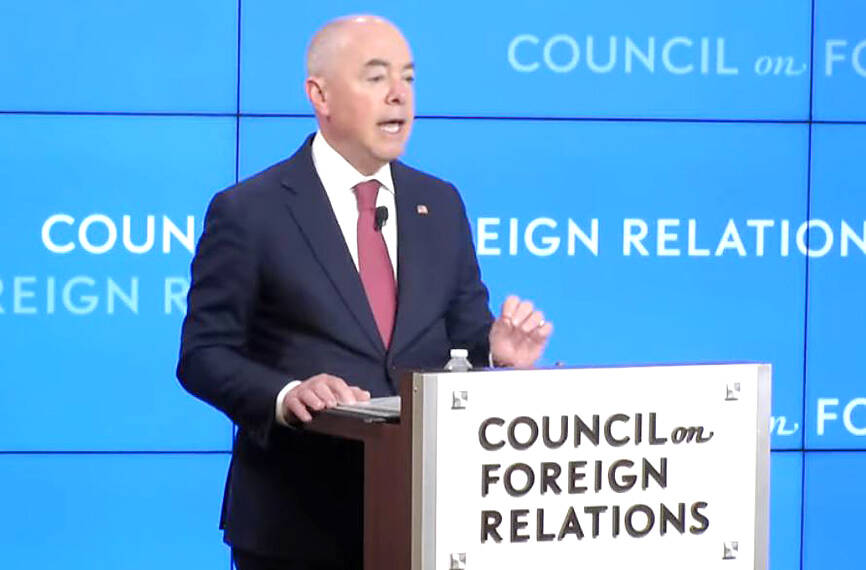The US has introduced an initiative to identify possible threats posed by China and develop plans to defend against them, US Secretary of Homeland Security Alejandro Mayorkas said.
Mayorkas on Friday announced the “90-day department-wide sprint” while delivering his first “state of homeland security address” at the Washington-based Council on Foreign Relations think tank.
The initiative is to “assess how the threats posed by the PRC [People’s Republic of China] will evolve and how we can be best positioned to guard against future manifestations of this threat,” he said.

Photo: Screenshot from a livestream
While listing the security issues the US is confronting, he singled out threats posed by China as among the most serious and related to all of the department’s missions.
“Beijing has the capability and the intent to undermine our interests at home and abroad and is leveraging every instrument of its national power to do so,” he said, citing as examples China’s aggressive provocation in the South China Sea and use of overseas police stations.
A Chinese invasion of Taiwan would put critical infrastructure in the US at risk of disruptive cyberattacks, so “we must ensure we are poised to guard against this threat today and into the future,” Mayorkas said.
The initiative focuses on two areas, he said.
The first is defending critical infrastructure in the US against China or China-sponsored attacks “designed to disrupt or degrade provision of national critical functions, sow discord and panic, and prevent mobilization of US military capabilities,” he said.
The other is to bolster screening and vetting efforts to identify travelers from China who would attempt to “collect intelligence, steal intellectual property and harass dissidents,” he added.
Mayorkas said he would make the initiative an ongoing effort, working with the US Congress, agencies and the private sector.
He said that the US has been intensifying its efforts to counter “adverse nation states,” which he identified as China, Russia, Iran and North Korea, as their interests in harming the US are intensifying.
Artificial intelligence (AI) is another potential threat to the US, as malicious actors could use the technology to disrupt fuel supplies, critical care delivery and school systems, he said.
The department is to launch an AI task force to lead the responsible uses of the technology in, for example, screening cargo, identifying the importation of goods produced with forced labor and tackling drug trafficking, he said.
The unit would also defend against malicious uses of AI, he added.
The US has to be positioned to meet the moment as nations such as China and Russia “upend our rules-based international order and threaten our security at home” through cyberattacks, abuse of trade and travel systems, and disinformation campaigns, he said.

OPTIMISTIC: The DGBAS sharply upgraded its GDP growth estimate from 3.54 percent to 7.71 percent after the Taiwan-US trade agreement signing and given AI optimism The US imported more from Taiwan than China for the first time in decades, as US President Donald Trump’s tariffs reshape trade flows while a global boom in artificial intelligence (AI) fuels demand for tech products. US purchases of goods from China plunged almost 44 percent in December last year from 2024 to US$21.1 billion, US Department of Commerce data showed on Thursday. By contrast, shipments from Taiwan more than doubled during the same period to US$24.7 billion. The soaring Taiwanese shipments to the US reflect the huge expansion in supplies of chips and servers for AI companies, which has completely changed

NON-NEGOTIABLE: The US president’s action ran counter to one of the US’ ‘six assurances’ on not consulting China about arms sales to Taiwan, US lawmakers said US President Donald Trump’s admission that he is discussing arms sales to Taiwan with Chinese President Xi Jinping (習近平) is “alarming and a blatant violation of US policy and the six assurances,” US Representative Ro Khanna said on Tuesday. Trump on Monday said he would decide soon on whether to send more weapons to Taiwan, after Xi warned him not to do so. “I’m talking to him about it. We had a good conversation, and we’ll make a determination pretty soon,” Trump told reporters aboard Air Force One when asked about warnings raised by Beijing during a phone call with Xi over

US and Chinese fighter jets briefly faced off above waters near the Korean Peninsula this week, Yonhap News agency reported, marking a rare confrontation in that area between the two superpowers. About 10 US fighter jets on Wednesday departed an airbase in Pyeongtaek, South Korea, for drills above international waters off South Korea’s western coast, the news outlet cited unidentified military sources as saying. While the US planes did not enter China’s air defense identification zone, Beijing scrambled planes as they neared that region, the report said. “The Chinese People’s Liberation Army organized naval and air forces to monitor and effectively respond

VACILLATING? Some US officials are concerned that Trump’s April visit to Beijing might be affected if Washington pushes through additional weapons sales to Taiwan A major US arms sales package for Taiwan is in limbo following pressure from Chinese President Xi Jinping (習近平) and concerns among some US officials that greenlighting the deal would derail US President Donald Trump’s upcoming visit to Bejing, the Wall Street Journal (WSJ) reported on Wednesday. Trump on Monday said that he would decide soon on whether to send more weapons to Taiwan, after Xi warned him not to do so. “I’m talking to him about it. We had a good conversation, and we’ll make a determination pretty soon,” Trump told reporters aboard Air Force One when asked about warnings raised